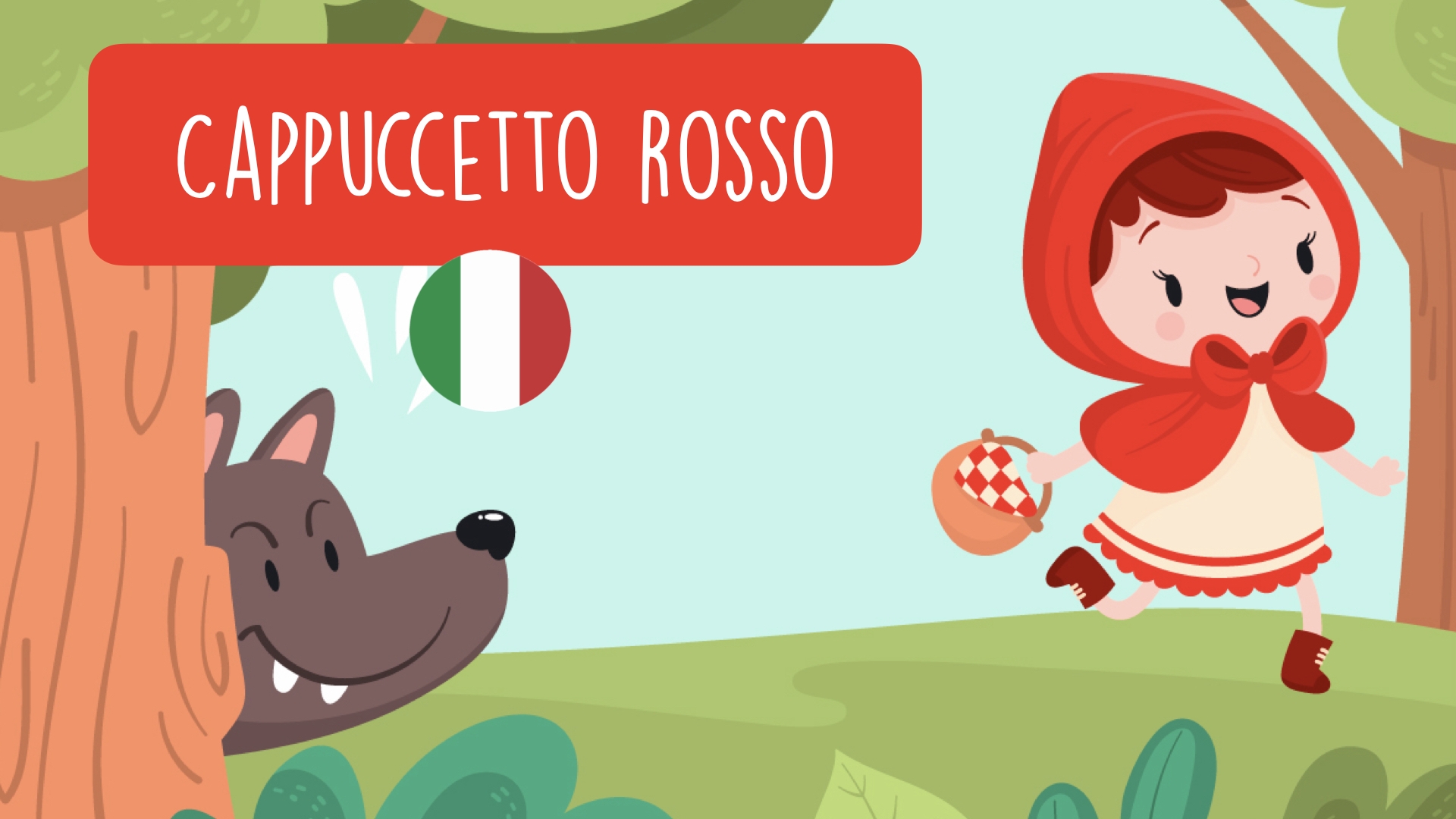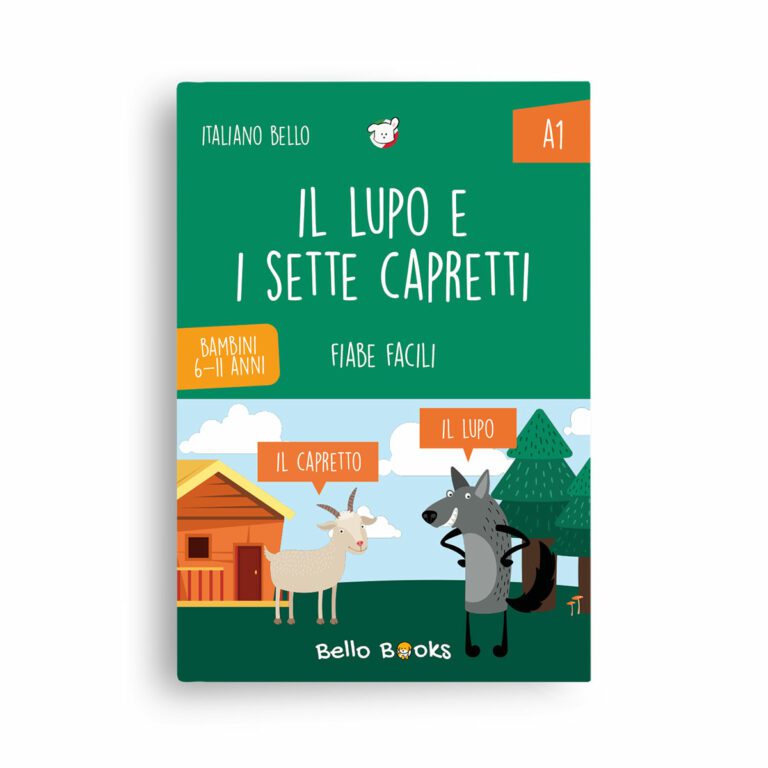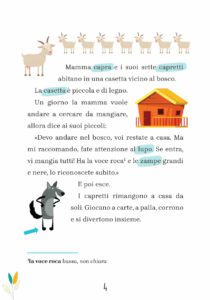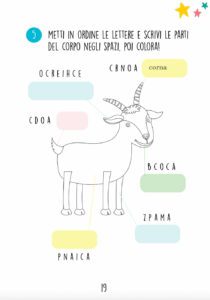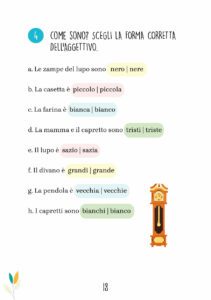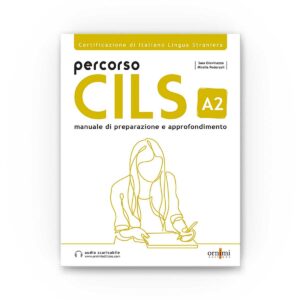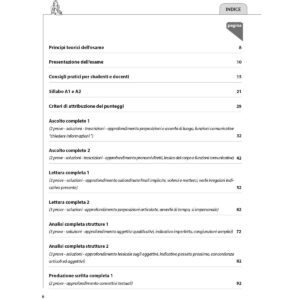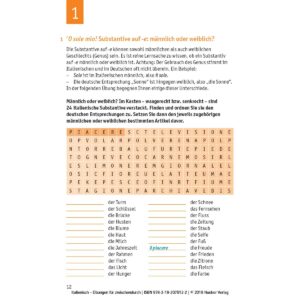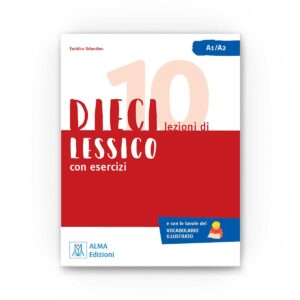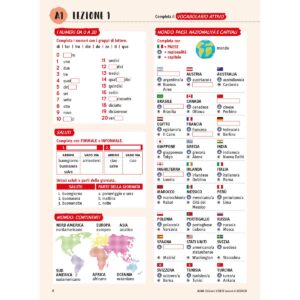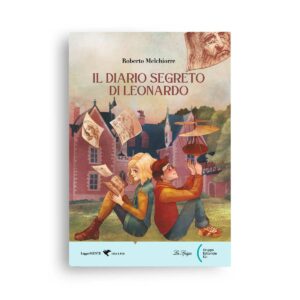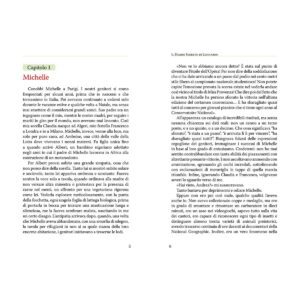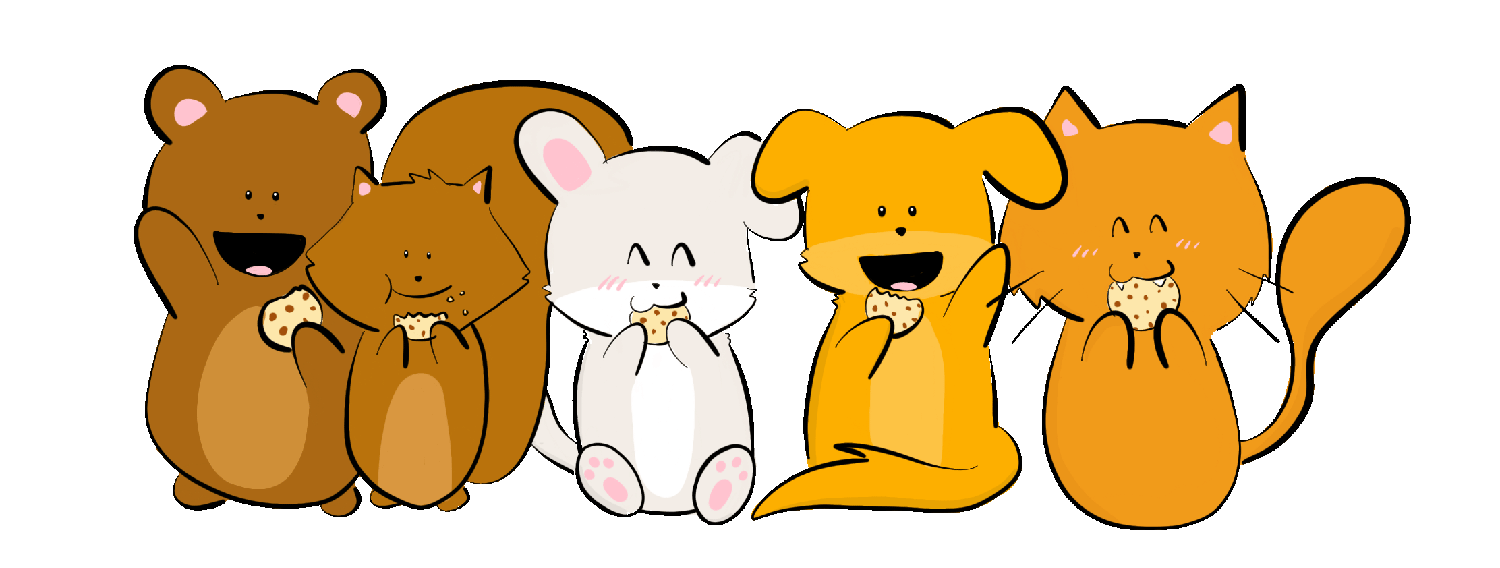Aprite, sono la vostra mamma!
Entdecke mit uns das Märchen il lupo e i sette capretti, der Wolf und die sieben Geißlein auf Italienisch!
Ein zeitloses Märchen in einfachem Italienisch für Anfänger (A1) aller Altersgruppen. Mit Hördatei und komplette deutsche und englische Übersetzung.
- Fiaba per A1
- Italiano-tedesco/inglese
- Tante attività per bambini
- Audio
- Italiano Bello
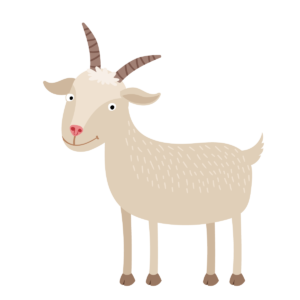
Das Heft für Kinder
Ein Heft für den Schulunterricht mit Kindern, die Italienisch als Zweit- oder Fremdsprache lernen. Mit schönen Illustrationen und vielen Aktivitäten zur spielerischen Förderung der Sprachkenntnisse. Auch als eBook (pdf) verfügbar.
Il lupo e i sette capretti
Mamma capra e i suoi sette capretti abitano in una casetta vicino al bosco. La casetta è piccola e di legno.
Un giorno la mamma vuole andare a cercare da mangiare, allora dice ai suoi piccoli:
«Devo andare nel bosco, voi restate a casa. Ma mi raccomando, fate attenzione al lupo. Se entra, vi mangia tutti! Ha la voce roca e le zampe grandi e nere, lo riconoscete subito.»
E poi esce. I capretti rimangono a casa da soli. Giocano a carte, a palla, corrono e si divertono insieme.
Poco dopo qualcuno bussa alla porta. Toc toc!
«Chi è?» chiedono i capretti.
«Sono la vostra mamma, aprite! Vi ho portato un bel regalo!»
Ma la voce è roca e i capretti capiscono che è il lupo.
«Non apriamo» dicono loro, «tu non sei la nostra mamma. La mamma ha una voce dolce, la tua è roca; tu sei il lupo.»
Allora il lupo va in città, entra in un negozio e compra un grosso pezzo di gesso. Lo mangia e così la sua voce diventa dolce.
Poi torna alla casa dei capretti e bussa alla porta. Toc toc!
«Chi è?» chiedono loro.
«Sono la vostra mamma, aprite! Vi ho portato un bel regalo!»
Ma il lupo appoggia la sua zampa nera sul davanzale della finestra e i capretti la vedono.
«Non apriamo. La nostra mamma ha le zampe bianche, le tue sono nere: tu sei il lupo.»
Allora il lupo va di nuovo in città, entra in una panetteria e compra un grosso sacco di farina; mette la zampa nera nel sacco e quella diventa tutta bianca.
Il lupo va per la terza volta alla casa dei capretti e bussa alla porta.
«Chi è?» chiedono loro.
«Sono la vostra mamma, aprite! Vi ho portato un bel regalo!»
«Prima vogliamo vedere la tua zampa.»
Allora il lupo appoggia la zampa sul davanzale della finestra e i capretti vedono che è bianca, così aprono felici la porta. Ma fuori dalla porta non c’è la mamma, ma il lupo!
I capretti sono spaventati e si nascondono: il primo sotto il tavolo, il secondo dentro un vaso, il terzo sotto il tappeto, il quarto dietro il divano, il quinto nell’armadio, il sesto dietro un cuscino, e l’ultimo, il più piccolo, nella pendola.
Ma il lupo li trova e uno dopo l’altro li mangia: uno, due, tre, quattro, cinque, sei…
«Che capretti deliziosi!» esclama il lupo, sazio e soddisfatto.
Poi esce dalla casa e si sdraia sotto un grande pino. Dopo pochi minuti si addormenta e inizia a russare forte. Ronf ronf!
Poco dopo mamma capra torna dal bosco. La porta è aperta ed è tutto in disordine. Che disastro!
Cerca i suoi capretti, ma non li trova. Cerca in cucina, in salotto, in camera da letto, in bagno, ma niente.
«Dove siete, piccoli miei?» chiama disperata.
«Mamma, aiutami! Non riesco a uscire, sono nella pendola» dice una vocina.
Lei aiuta il capretto più piccolo a uscire dalla pendola. Lui le racconta che è arrivato il lupo e ha mangiato tutti i suoi fratelli.
La mamma e il capretto sono tristi, si abbracciano e piangono.
Escono di casa e camminano nel bosco. Dopo un po’ vedono il lupo: sta dormendo e ha la pancia molto grossa.
Mamma capra ha un’idea e dice al capretto:
«Vai a casa e prendi forbici, ago e filo.»
Lui corre a casa più veloce che può, prende le cose e torna dalla mamma.
Lei prende le forbici e fa un taglio nella pancia del lupo.
Subito un capretto salta fuori, poi un altro, e un altro ancora. Uno dopo l’altro saltano fuori tutti e sei. Che gioia!
I capretti si abbracciano felici.
Poi la mamma dice: «Andate a prendere dei grossi sassi.»
I capretti raccolgono dei sassi, li mettono nella pancia del lupo e poi la mamma la chiude con ago e filo. Infine si nascondono dietro un albero e aspettano.
Dopo un po’ il lupo si sveglia, ma non si sente molto bene. Ha molta sete e vuole andare al fiume a bere. Cammina lentamente perché ha la pancia pesante.
Mentre cammina pensa:
«Erano dei capretti buoni,
adesso sembrano dei gran pietroni!»
Finalmente raggiunge il fiume, ma la sua pancia è così pesante che cade in acqua.
«Aiuto!» grida, ma nessuno lo aiuta.
Il fiume lo porta via, lontano lontano.
«Evviva! Evviva!» urlano i capretti e saltano di gioia.
Il lupo non torna più e mamma capra e i sette capretti vivono per sempre felici e contenti.
Mama Ziege und ihre sieben Geißlein leben in einem kleinen Haus am Waldrand. Das Häuschen ist klein und aus Holz gebaut.
Eines Tages will die Mama hinausgehen, um nach Futter zu suchen, also sagt sie zu ihren Kindern:
»Ich muss in den Wald gehen, ihr bleibt zu Hause. Aber seid vorsichtig vor dem Wolf. Wenn er hereinkommt, wird er euch alle auffressen! Er hat eine heisere Stimme und große schwarze Pfoten, ihr werdet ihn sofort erkennen.«
Und dann geht sie hinaus. Die Geißlein bleiben allein zu Hause. Sie spielen Karten, Ball, laufen herum und haben Spaß miteinander.
Kurze Zeit später klopft es an der Tür. Klopf, klopf!
»Wer ist da?«, fragen die Geißlein.
»Ich bin’s, eure Mutti, macht auf! Ich habe euch ein schönes Geschenk mitgebracht!«
Aber die Stimme ist rau und die Kinder merken, dass es der Wolf ist.
»Wir machen nicht auf«, sagen sie, »du bist nicht unsere Mama. Mama hat eine süße Stimme, deine ist rau; du bist der Wolf.«
Also geht der Wolf in die Stadt, geht in einen Laden und kauft ein großes Stück Kreide. Er isst es und so wird seine Stimme süß.
Dann geht er zurück zum Haus der Geißlein und klopft an die Tür. Klopf, klopf!
»Wer ist da?«, fragen sie.
»Ich bin’s, eure Mutti, macht auf! Ich habe euch ein schönes Geschenk mitgebracht!«
Aber der Wolf legt seine schwarze Pfote auf das Fensterbrett und die Kinder sehen sie.
»Wir machen nicht auf. Unsere Mutter hat weiße Pfoten, deine sind schwarz: Du bist der Wolf.«
Also geht der Wolf wieder in die Stadt, geht in eine Bäckerei und kauft einen großen Sack Mehl; er steckt seine schwarze Pfote in den Sack und sie wird ganz weiß.
Der Wolf geht zum dritten Mal zum Haus der Geißlein und klopft an die Tür.
»Wer ist da?«, fragen sie.
»Ich bin es, eure Mutter, macht auf! Ich habe euch ein schönes Geschenk mitgebracht!«
»Zuerst wollen wir deine Pfote sehen.«
Also legt der Wolf seine Pfote auf das Fensterbrett, und die Geißlein sehen, dass sie weiß ist, und öffnen fröhlich die Tür. Aber draußen vor der Tür steht nicht Mama, sondern der Wolf!
Die Geißlein haben Angst und verstecken sich: das erste unter dem Tisch, das zweite in einem Topf, das dritte unter dem Teppich, das vierte hinter dem Sofa, das fünfte im Kleiderschrank, das sechste hinter einem Kissen und das letzte, das kleinste, in der Pendeluhr.
Aber der Wolf findet sie und frisst sie nacheinander: eins, zwei, drei, vier, fünf, sechs…
»Was für köstliche Geißlein!«, sagt der Wolf, satt und zufrieden.
Dann verlässt er das Haus und legt sich unter einer großen Kiefer nieder. Nach ein paar Minuten schläft er ein und beginnt laut zu schnarchen. Schnarch, schnarch!
Kurze Zeit später kommt Mama Ziege aus dem Wald zurück. Die Tür steht offen und alles ist in Unordnung. Was für ein Durcheinander!
Sie sucht nach ihren Geißlein, kann sie aber nicht finden. Sie sucht in der Küche, im Wohnzimmer, im Schlafzimmer, im Bad, aber nichts.
»Wo seid ihr, meine Kleinen?«, ruft sie verzweifelt.
»Mama, hilf mir! Ich kann nicht raus, ich stecke in der Pendeluhr«, sagt eine leise Stimme.
Sie hilft dem kleinsten Geißlein aus der Pendeluhr. Es erzählt ihr, dass der Wolf gekommen ist und alle seine Brüder gefressen hat.
Die Mama und das Geißlein sind traurig, sie umarmen sich und weinen.
Sie verlassen das Haus und gehen in den Wald. Nach einer Weile sehen sie den Wolf: er schläft und hat einen sehr großen Bauch.
Mama Ziege hat eine Idee und sagt zu dem Geißlein:
»Geh nach Hause und hol Schere, Nadel und Faden.«
Er rennt so schnell er kann nach Hause, holt die Sachen und geht zurück zu seiner Mutter.
Sie nimmt die Schere und macht einen Schnitt in den Bauch des Wolfes.
Sofort springt ein Geißlein heraus, dann noch eins, und noch eins. Einer nach dem anderen springen alle sechs heraus. Was für eine Freude!
Die Geißlein umarmen sich freudig.
Dann sagt die Mama: »Geht und holt ein paar große Steine.«
Die Kinder holen ein paar Steine, stecken sie in den Bauch des Wolfes und dann verschließt Mama ihn mit Nadel und Faden. Schließlich verstecken sie sich hinter einem Baum und warten.
Nach einer Weile wacht der Wolf auf, aber er fühlt sich nicht sehr gut. Er ist sehr durstig und will zum Fluss gehen, um zu trinken. Er geht langsam, denn sein Bauch ist schwer.
Während er läuft, denkt er:
»Sie waren gute Geißlein,
jetzt wirken sie wie große Steine!«
Endlich erreicht er den Fluss, aber sein Bauch ist so schwer, dass er ins Wasser fällt.
»Hilfe!«, schreit er, aber niemand hilft ihm.
Der Fluss trägt ihn weg, weit weg.
»Hurra! Hurra!« schreien die Geißlein und springen vor Freude.
Der Wolf kehrt nie wieder zurück, und Mama Ziege und die sieben Geißlein leben glücklich bis an ihr Lebensende.
Mama Goat and her seven little goats live in a little house on the edge of the forest. The little house is small and made of wood.
One day, mama goat wants to go out to look for food, so she says to her kids:
“I have to go to the forest, you stay at home. But be careful of the wolf. If he comes in, he will eat you all! He has a rough voice and big black paws, you’ll recognize him right away.”
And then she goes out. The little goats stay home alone. They play cards, ball, run around and have fun together.
A short time later, there is a knock at the door. Knock, knock!
“Who is there?” the little goats ask.
“It’s me, your mum, open up! I’ve brought you a nice present!”
But the voice is rough and the little goats realize it’s the wolf.
“We’re not going to open up,” they say, “you’re not our mum. Mama has a sweet voice, yours is rough; you are the wolf.”
So the wolf goes to town, enter a store, and buys a big piece of chalk. He eats it and so his voice becomes sweet.
Then he goes back to the little goat’s house and knocks on the door. Knock, knock!
“Who is there?” they ask.
“It’s me, your mum, open up! I’ve brought you a nice present!”
But the wolf puts his black paw on the window sill and the children see it.
“We won’t open the door. Our mum has white paws, yours are black: you are the wolf.”
So the wolf goes back to town, enters a bakery and buys a big bag of flour; he puts his black paw in the bag and it turns all white.
The wolf goes to the house of the little goats for the third time and knocks on the door.
“Who is there?” they ask.
“It’s me, your mum, open up! I have brought you a nice present!”
“First we want to see your paw.”
So the wolf puts his paw on the window sill, and the little goats see that it is white, and happily open the door. But outside the door is not Mama, but the wolf!
The little goats are afraid and hide: the first under the table, the second in a pot, the third under the carpet, the fourth behind the sofa, the fifth in the closet, the sixth behind a pillow and the last, the smallest, in the pendulum clock.
But the wolf finds them and eats them one by one: one, two, three, four, five, six….
“What delicious little goats!” says the wolf, full and satisfied.
Then he leaves the house and lies down under a big pine tree. After a few minutes he falls asleep and begins to snore loudly. Ronf, ronf!
A short time later, mama goat comes back from the forest. The door is open and everything is in disarray. What a mess!
She looks for her little goats, but can’t find them. She looks in the kitchen, the living room, the bedroom, the bathroom, but nothing.
“Where are you, my little ones?” she cries desperately.
“Mom, help me! I can’t get out, I’m stuck in the pendulum clock,” says a soft voice.
She helps the smallest goat out of the pendulum clock. He tells her that the wolf has come and eaten all his brothers.
The mum and the little goat are sad, they hug each other and cry.
They leave the house and go into the forest. After a while they see the wolf: he is sleeping and has a very big belly.
Mama goat has an idea and says to the little goat:
“Go home and get scissors, needle and thread.”
He runs home as fast as he can, gets the things and goes back to his mother.
She takes the scissors and makes a cut in the wolf’s belly.
Immediately a little goat jumps out, then another, and another. One by one, all six jump out. What a joy!
The little goats hug each other joyfully.
Then the mama says, “Go and get some big stones.”
The children get some stones, put them in the wolf’s belly, and then mama closes it with needle and thread. Finally, they hide behind a tree and wait.
After a while the wolf wakes up, but he doesn’t feel very well. He is very thirsty and wants to go to the river to drink. He walks slowly because his belly is heavy.
As he walks, he thinks:
“They were good little goats,
now they seem like big stones!”
At last he reaches the river, but his belly is so heavy that he falls into the water.
“Help!” he cries, but no one helps him.
The river carries him away, far away.
“Hooray! Horray!” the little goats cry, jumping for joy.
The wolf never returns, and mama goat and the seven little goats live happily ever after.
LEGGI ALTRE STORIE
Il miracolo dei colori (A1)
Il giorno prima di Pasqua un coniglietto cammina nel bosco… CON VIDEO ED ESERCIZI
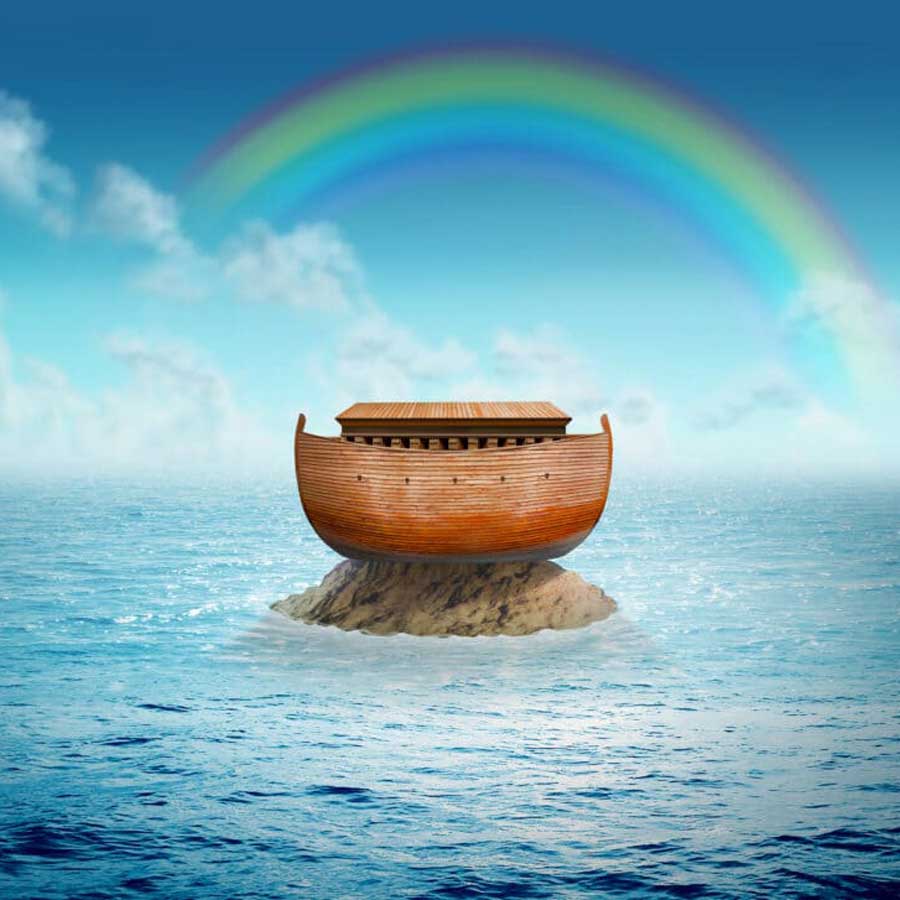
La storia del diluvio universale (l’arca di Noè)
La storia del diluvio universale • dal Calendario di Pasqua
